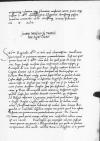List #3135
Ioannes DANTISCUS do Bona SforzaHeilsberg (Lidzbark Warmiński), 1543-04-05
Regest polski:
Wieść o zabiciu króla Szkocji [Jakuba V Stewarta], którą przekazał w poprzednim liście z 1 kwietnia, znajduje potwierdzenie. Możni szkoccy, których król Anglii [Henryk VIII] uwolnił i hojnie obdarowawszy, wysłał do Szkocji, zostali pojmani po oblężeniu pewnego zamku, uznani za zdrajców i odesłani z powrotem przez prymasa [Davida Beatona] i jego stronników. Jeśli zgadza się to z rzeczywistością, król Anglii będzie zawiedziony. W nowinach donoszą, że król Anglii wysłał 100 uzbrojonych okrętów do Hiszpanii, a cesarz, dołączywszy do nich 200 swoich, wybiera się do Belgii. Ponadto król Anglii wypowiedział wojnę Francji.
Nie udało się zażegnać sporu między Habsburgami a księciem Geldrii [Wilhelmem Bogatym], z nastaniem lata doprowadzi on do niemałego zamieszania. O tyranie szwedzkim [Gustawie I Wazie] wciąż utrzymuje się ta sama pogłoska, że zaciąga żołnierzy. Posiadający liczną flotę hamburczycy odzyskali dzięki układom niemało okrętów od Habsburgów. Przyłączyli się do nich, opuszczając Duńczyków, i prowadzą żeglugę do Anglii i do zwyczajnych portów.
Dantyszek będzie bardzo wdzięczny za odpowiedź, zwłaszcza na to, co zapisał wciąż chorą ręką na dołączonej do listu karcie.
Rękopiśmienne podstawy źródłowe:
Pomocnicze podstawy źródłowe:
| ||||||||||
Tekst + aparat krytyczny + komentarz Zwykły tekst Tekst + komentarz Tekst + aparat krytyczny
Serenissima Reginalis Maiestas et Domina, domina clementissima. Humillimam servitiorum et orationum mearum commendationem.
Post cf.
Inter  BJ, 6657, f. 396v
solitos navigationem struunt.
BJ, 6657, f. 396v
solitos navigationem struunt.
Haec sunt, quae de novis parens Serenissimae Maiestatis Vestrae iussis cum hoc nuntio scribenda se offerunt, cum quo mihi inter eundum occursuro. Si Serenissima Maiestas Vestra rescribi commiserit (quod summopere peto), ad ea praesertim, quae adhuc affecta manu in scheda exaravi, gratissimam mihi gratiam impartiet Serenissima Maiestas Vestra. Cui me suppliciter commendo atque omnia faustissima in aetate diutissime florente a domino deo intime precor.

